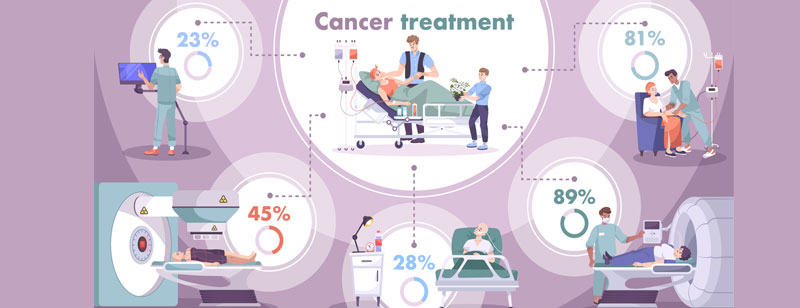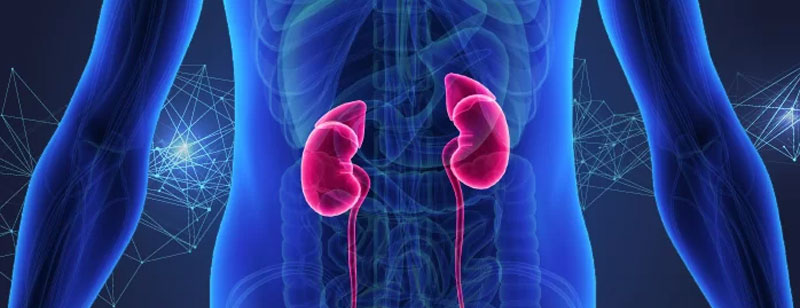Cancer Management
Cancer management involves a comprehensive approach to diagnosing, treating, and supporting individuals with cancer. The specific management plan depends on the type and stage of cancer, as well as the individual's overall health and preferences.
Malignancies of Kidney
Malignancies of the kidney primarily refer to kidney cancer, with renal cell carcinoma being the most common type. Kidney cancer typically begins in the renal tubules, the tiny tubes within the kidneys responsible for filtering waste products from the blood to form urine. Here is a description of malignancies of the kidney, focusing on renal cell carcinoma:
Renal Cell Carcinoma (RCC):
- Renal cell carcinoma is the most common type of kidney cancer, accounting for around 90% of all cases. It usually originates in the cells lining the small tubes (tubules) in the kidney.
- Risk Factors: Several risk factors are associated with RCC, including smoking, obesity, high blood pressure, family history of kidney cancer, and certain genetic conditions.
- Symptoms: Early-stage RCC often has no symptoms. However, as the tumor grows, common symptoms may include blood in the urine, back pain, a mass or lump in the abdomen, unexplained weight loss, and fatigue.
- Diagnosis: Diagnosis is typically made through a combination of imaging studies, such as CT scans and MRIs, and a biopsy of the tumor.
- Treatments: Management of malignant Rena tumour involves radical or partial nephrectomy which may be done by laparoscopic or minimally invasive means .... Recent techniques like RFA and cryoablation can be done in select cases with small tumours.
Upper Tract
Upper tract cancer management primarily refers to the treatment of cancers that occur in the upper urinary tract, specifically the renal pelvis (the top part of the ureter) and the ureter itself. The most common type of upper tract cancer is urothelial carcinoma. The management of upper tract cancer typically involves a combination of treatment modalities:
Diagnosis and Staging:
- Upper tract cancer is diagnosed through procedures such as ureteroscopy, retrograde pyelography, CT urography, and biopsy. Staging determines the extent of the cancer's spread.
Management:
- Nephroureterctomy with bladder cuff removal is the preferred procedure of choice... Consensus regarding neoadjuvant and adjuvant therapy varies and is to be decided on case to case basis.
Bladder
Bladder cancer management involves a multi-faceted approach that includes diagnosis, treatment, and follow-up care. The specific management plan depends on the type and stage of bladder cancer, as well as the patient's overall health and preferences. Here is an overview of bladder cancer management:
Diagnosis:
- Cystoscopy: A cystoscope is used to examine the inside of the bladder. If abnormalities are found, a biopsy is performed to confirm the presence of cancer.
- Imaging: Imaging tests such as CT scans, MRI, and intravenous pyelogram (IVP) may be used to determine the extent of the cancer and identify potential metastasis.
- Staging: Staging determines the extent of the cancer's spread and is a critical factor in determining the appropriate treatment. Stages include non-invasive (confined to the inner lining of the bladder), invasive (spreading into the muscle layer), and advanced/metastatic (spreading beyond the bladder).
- Neoadjuvant Therapy: For advanced bladder cancer, chemotherapy may be given before surgery to shrink tumors and improve surgical outcomes.
- Treatment: For high grade non muscle invasive cancer - periodic BCG instillation, cytology and cystoscopies are recommended whereas muscle invasive cancer entails treatment by radical cystectomy with ileal conduit or Neo ladder formation according to case findings.
Prostate
Prostate cancer management involves a comprehensive approach to diagnose, treat, and support individuals with prostate cancer. The specific management plan depends on the type and stage of prostate cancer, as well as the individual's overall health and preferences.
Testes - Including Conventional Surgeries
Testicular cancer management involves a comprehensive approach that includes diagnosis, treatment, and follow-up care. The specific management plan depends on the type and stage of testicular cancer, as well as the patient's overall health and preferences.
Neoadjuvant Therapy
Neoadjuvant therapy is a medical treatment approach used in cancer management, which involves the administration of therapy before the primary treatment, such as surgery or radiation therapy. This approach is primarily employed in the context of cancer care and has several important purposes:
- Shrinking Tumors: Neoadjuvant therapy is often used to reduce the size of the primary tumor before surgery. This can make the tumor easier to remove or increase the likelihood of a successful surgical outcome.
- Downstaging: By shrinking the tumor, neoadjuvant therapy can also help "downstage" the cancer, meaning it reduces the extent of the disease. This can be particularly valuable in cases where the cancer has spread locally.
- Assessing Treatment Response: Neoadjuvant therapy provides a way to assess how well the cancer responds to a specific treatment. If the tumor responds favorably, it may indicate that the selected treatment is effective, which can guide further management decisions.
- Preserving Organ Function: In some cases, neoadjuvant therapy can make it possible to preserve an organ's function. For example, in breast cancer, neoadjuvant chemotherapy may shrink a tumor to a size where a lumpectomy (breast-conserving surgery) is feasible instead of a mastectomy.







